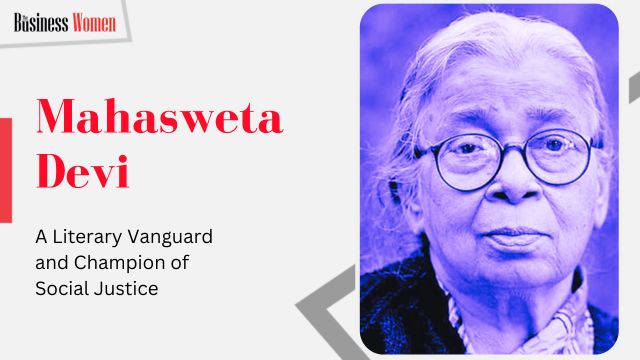Mahasweta Devi: A Literary Vanguard and Champion of Social Justice
Mahasweta Devi stands tall as a pioneering figure in Indian literature, leaving an indelible mark through her profound writings and unwavering activism. Born on January 14, 1926, in Dacca, British India (now Dhaka, Bangladesh), she was nurtured in a family steeped in literary tradition, inheriting both creativity and social consciousness from her parents, Manish Ghatak and Dharitri Devi. Her educational journey, spanning institutions like Midnapore Mission Girls High School, Santiniketan, and Calcutta University, equipped her with a robust academic foundation and a deep appreciation for India’s diverse cultures.
Literary Legacy
Mahasweta Devi’s literary repertoire, encompassing over 100 novels and 20 collections of short stories primarily in Bengali, transcends mere storytelling. Her debut novel, “Jhansir Rani” (1956), which delves into the life of the Rani of Jhansi, marked the genesis of her profound dedication to the marginalised sections of society.
Specialising in portraying the lives of Adivasis, Dalits, and other marginalised communities, Mahasweta Devi delved deep into their struggles, becoming a fervent advocate for their rights. Her narratives, rich with folklore and mythological elements, pay homage to the resilience of the individuals she encountered during her extensive research and activism.
Activism for Social Justice
Mahasweta Devi’s activism was as formidable as her literary prowess, as she ardently challenged the discrimination faced by tribal communities. Her novel “Aranyer Adhikar” (1977), centred around the tribal leader Birsa Munda, spurred her successful advocacy for the correction of an unjust sculpture in Jharkhand.
She vociferously opposed the industrial policies of West Bengal’s Communist Party, condemning the confiscation of agricultural land. Her involvement in the Nandigram agitation galvanised intellectuals, artists, and writers against the contentious policy. Her commitment extended to petitions against death sentences, showcasing her unwavering dedication to justice and compassion.
Personal Life and Demise
Mahasweta Devi’s personal life, including her marriage to playwright Bijon Bhattacharya in 1947 and the birth of her son, Nabarun Bhattacharya, was marked by diverse talents and a commitment to her principles. Despite her literary acclaim, she worked in a post office until her dismissal due to her communist affiliations. In 1962, she married author Asit Gupta.
Mahasweta Devi breathed her last on July 28, 2016, at the age of 90, succumbing to multiple health complications. Her demise was deeply mourned, prompting tributes from across India.
Awards and Honors
Mahasweta Devi’s exceptional contributions garnered her numerous awards and recognitions, including the Sahitya Akademi Award, Padma Shri, Jnanpith Award, Ramon Magsaysay Award, Padma Vibhushan, SAARC Literary Award, and a Nobel Prize nomination.
Conclusion
Mahasweta Devi’s life and works epitomise the transformative potential of literature and activism. Her narratives shed light on the struggles of the marginalised, inspiring generations to strive for justice and equality. As her legacy continues to endure, Mahasweta Devi remains a guiding light for those advocating social change, firmly establishing her as a literary pioneer and a luminary in the realm of activism.

